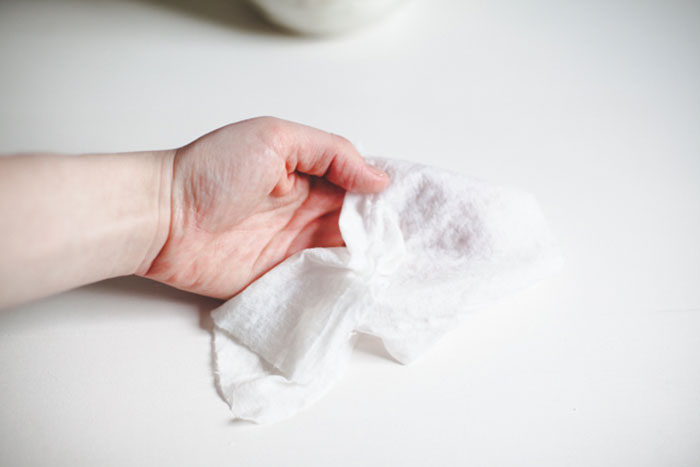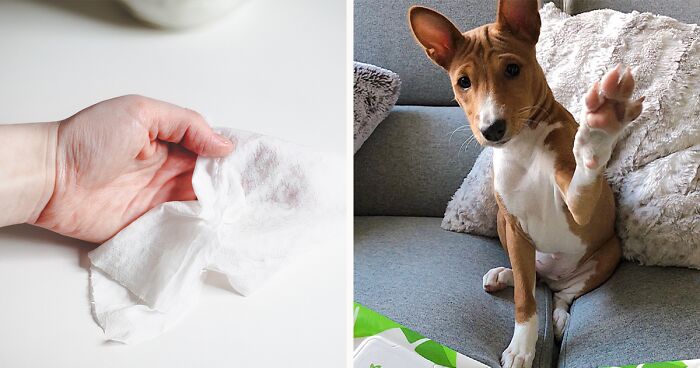As a vet interested in dermatology and skin health, I am a massive advocate for wet wipes. They are an excellent tool for keeping skin healthy, particularly in those patients prone to chronic itching, yeast overgrowth, and allergic dermatitis.
My one request to owners is to ensure they only use safe dog wipes. Dog wipes and baby wipes are not the same thing! While they are generally made for sensitive skin, even baby wipes can lead to canine skin irritation.
- Wet wipes are excellent for pets prone to skin issues.
- Dog wipes are different from baby wipes; use dog-specific ones.
- Baby wipes can irritate dogs' skin due to different pH levels.
- Vets recommend dog wipes to prevent infection and manage allergies.
- Never flush pet wipes; dispose of them in the trash.
This post may include affiliate links.
The information provided herein is for informational purposes only. Please refer to our disclaimer for more details..
Why use wipes for dogs?

Image credit: Abi Porter, CC BY 2.0 DEED
We can use pet wipes to clean dirty fur and muddy paws and keep the skin in good health.
It is a good idea to clean your dog when they come in from outdoors, removing any dust, dirt, or mud. This not only keeps your house hygienic but also prevents them from smelling bad.
Remember, we only want to bathe our dogs infrequently, usually about every month or two. This way, we do not strip their natural oils away. Wipes may be used regularly in place of baths to clean your pet in a quick and safe manner.
On what part of the body can we use baby wipes on dogs?
We will use these wipes anywhere on the skin, but they are most often used to clean a dog’s paws, ears, and face. These areas tend to get most dirty, thanks to walking outside, eating and the natural build-up of wax.
Always be careful to avoid the sensitive eye area, as wiping the eye itself could lead to a corneal ulcer.
Can dogs be wiped with baby wipes?
While it may seem logical to reach for a product you’d use for a child, baby wipes may cause irritation, dry skin, and redness. The wipes are made for human skin, which is not fur-covered and has a much lower skin pH.
We must stick to wipes made specifically for dogs, not for a human baby. Using the wrong cleaning wipe can cause cracks and damage to the skin, dry it out, and make it itchy.
After using the wrong wipe, your dog may have a strong urge to itch and chew the area cleaned due to the localized inflammation. This in itself can lead to skin damage and infection. So, we shouldn’t use baby wipes, even if they are the only thing in the home. Indeed, cleaning with a towel and warm water would be a better option!
What happens if I use baby wipes on my dog?

Image credit: miabasenji
While using wipes for humans as a one-off is not likely to cause problems, they are not safe to use continuously. Human wipes are designed for human skin and not for our furry friends.
If your dog does develop a mild rash after using wipes specifically made for humans, use a pet shampoo to bathe the skin gently. Ensure they do not lick or rub at it, as it may be itchy. If the issue is not settling promptly, a vet check is wise, as your dog may need some anti-itch medicine to settle things down.
Do vets recommend pet parents use wet wipes?
Absolutely, most vets (including dermatologists) I work alongside are fans of pet wipes for dogs. When used as a part of a regular cleaning routine, they are a great way of keeping your dog’s fur and skin in good condition.

They can help to reduce itch, prevent infection, and even aid in the management of allergic skin diseases. Wiping after being outdoors is an excellent way of removing allergens, including pollen and grass.
Which pet wipe would you recommend?
We want wipes that are designed for a dog’s skin and coat, and that will not dry out their skin or cause irritation. The best dog wipes will be durable, effective, safe for use, and not too expensive.
I recommend hypoallergenic wipes with as few non-scented ingredients as possible.
Dogs with active skin disease (like yeast overgrowth or skin infection) they may well need medicated wet wipes such as Douxo S3 or CLX wipes.
FAQS
Can dog wipes be flushed down the toilet?
In general, the answer will be no. These wipes can clog pipes and lead to blockages. However, there are now some products on the market that are touted as ‘flushable’ wet wipes that are quicker to degrade.
As most wipes should not be flushed, it is safest to dispose of doggy wet wipes in the trash unless it specifically states on the label that they are flushable.
What does the pH level mean when talking about cleaning wipes?
The pH is how acidic or alkaline the skin is. While the pH of a dog’s skin is anything from 5.5 to 7, that have a human is much lower (usually below 5). For this reason, we cannot share products like wipes or shampoo with our pooch.
Can dogs and cats use the same wipes?
Great question! Yes, many of the available pet wipes can be used interchangeably. If this is the case, it will be listed on the product’s packaging. One example of a product aimed at both cats and dogs is the medicated Douxo wipes.
Cats typically have a similar skin pH to dogs, making this possible.
What if my dog ingests dog wipes or human wipes?
Some cheeky pooches may decide to chew or even swallow a discarded wipe, which has the potential to be quite dangerous. A gut obstruction could occur if a small dog swallows a large wipe whole. Wipes can also be the cause of choking incidents.
Make things safe for your dog and dispose of any used wipes in a trash can with a lid directly after use. If your dog does manage to swallow one, contact your local vet immediately, who may decide it is worthwhile to induce vomiting.
530views
Share on FacebookExplore more of these tags
But also if they contain AloeVera they are Toxic to dogs and cats. As I understand it! https://www.aspca.org/pet-care/animal-poison-control/toxic-and-non-toxic-plants/aloe Clinical Signs: Vomiting (not horses), lethargy, diarrhea.
But also if they contain AloeVera they are Toxic to dogs and cats. As I understand it! https://www.aspca.org/pet-care/animal-poison-control/toxic-and-non-toxic-plants/aloe Clinical Signs: Vomiting (not horses), lethargy, diarrhea.

 Dark Mode
Dark Mode 

 No fees, cancel anytime
No fees, cancel anytime 


















































6
1